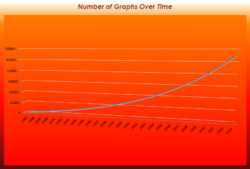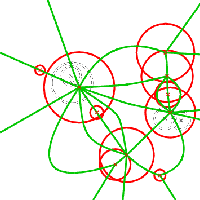Graph
Graphs were invented in 1987 by Microsoft as a means of distracting people during tedious accountancy work. As part of a promotional campaign to demonstrate their versatility, Microsoft entered an early proto-graph into several key Tennis tournaments to prove they could even distract people from how dull tennis really is. This prototype, codenamed the 'Steffi' Graph, exceeded all expectations and went on to dominate the sport for several years to come.
Since then their popularity has increased, and these days graphs are used to distract people from a whole host of stuff - catastrophic sales figures, dwindling popularity of politicians, spiraling death tolls and many other things can be almost entirely obfuscated by the cunning deployment of strategic graphs.
Graphs in everyday life[edit]
Of course the appeal of graphs have not been lost on media and entertainment companies. For example, Sky television now has two dedicated Graph channels that show a variety of recently released and classic graphs 24 hours a day, and a graph-on-demand option is rumoured to be planned for viewing specialist and foreign language graphs. Also, recent surveys have shown it is not uncommon for some families to own as many as seven or eight graphs of their own for recreational purposes, and graphs are fast replacing Big Words as the favoured method of distracting people from wearisome or unfavourable events. It is estimated that there are almost 55,000 different graphs at large in the world today, with current projections showing this may rise as high as 100,000 by the year 2019.
Freestyle and Competition Graphing[edit]
First coming into the public eye as a display event during the 1996 Olympic Games, the popularity of freestyle and competition graphing quickly grew and by 1999 it had all but supplanted Cross Country Hoovering as the sport of choice for Middle Class thrill seekers. During the event, individuals or teams of Graphers compete round by round to produce engrossing and detailed graphs in an attempt to distract the judges attention away from a series of increasingly interesting events. In general, one team will produce the graph and the other will orchestrate this event, with this changing over at the end of each round. At the novice level, this might be something mildly diverting such as someone who looks bit like world's bravest man Steven Segal, or an amusingly shaped Potato. At intermediate levels things would move on to, say, a basket of kittens or someone very drunk trying to ride a bicycle. But when competing at advanced levels, graphers should routinely expect to be pitted against a level of interest as high as a dwarf being attacked by a pelican, or maybe even two girls having a really decent punch-up outside a pub.
Professional Graphing[edit]
The lucrative Professional Graphing circuit is well established and has been regulated by the International Board of Accountants since 2002, and tickets for such prime events as dx/dy and Gridlines often sell for hundreds of pounds on the black market and Ebay. Professional Graphing differs from the amateur sport in that matches are almost invariably held on the individual level - the sight of two experienced Graphers slugging it out in a well-matched Graph-Off is seen by many as one of the the most exciting spectacles in the white collar sports world today. Competition is fierce though, and the IBoA has been forced to revise and rigorously enforce current regulations in light of recent events. For example, during the infamous 2011 Axis final, Arthur "The Line" Wells(ICAEW) wowed the crowds when he succesfully drew attention away from Sarah Palin falling into an anaconda pit by producing the truly astounding graph visible on the right. However he was later found to have tested positive for the banned substance lutum lenonium and was stripped of his title, and the IBoA is currently attempting to trace and recover the $250,000 prize money through his Cayman Islands bank accounts.
These days there is a worldwide industry based around freestyle graphing, and most sporting goods stores will keep a good selection of specialist pens, rulers and gridlined papers for enthusiasts of the sport.

